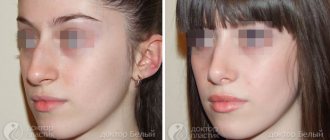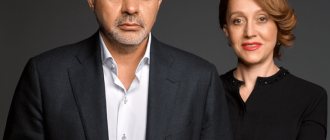Plastic surgeon Denis Agapov
There are more than enough plastic surgeons in today's Russia. Their number in Moscow alone amounts to several thousand. Having decided on plastic surgery, the patient can simply get confused in the networks of advertising slogans, bright colorful signs, dizzying special offers from various aesthetic surgery clinics. Not all people planning to correct their appearance know that one of the most obvious indicators of a surgeon’s truly high professionalism is his current membership in the International Society of Aesthetic Plastic Surgeons (ISAPS).
There are not so many such plastic specialists in our country. One of them is a candidate of medical sciences, plastic surgeon Denis Agapov, who was trained by Oscar Ramirez himself. Dr. Agapov is the head of the MEDICI plastic surgery and cosmetology clinic, which welcomes thousands of patients every year. We attended an appointment with Denis Genrikhovich, but not as patients, but on behalf of our portal. Read in this interview about our conversation with the doctor about facial plastic surgery and the distinctive features of domestic plastic surgery.
Corr.: Denis Genrikhovich, I would like to start our dialogue with the question of facial plastic surgery, which is in great demand today. It is known that patients ask surgeons to perform this operation in order to rejuvenate, but it is also known that not all people agree to go under a surgical scalpel, explaining this by the fear of being left with an unnatural face. How to avoid this?
Denis Agapov: According to a survey of 20,000 Russians aged 35 to 65 conducted this year, 60% of them are afraid to have a facelift because they are simply afraid of getting a “doll” face - unnaturally stretched, in some places even overstretched and skewed. But many of those surveyed want this operation to be performed on them! It turns out that the issue is only this fear and uncertainty about the professional capabilities of a plastic surgeon. In this regard, I want to tell your readers: the face of a “doll” after a facelift is almost an obsolete phenomenon in plastic surgery, and it can only become so after a traditional facelift. Of course, some specialists still work with this technique, but every year there are fewer and fewer of them. Surgeons began to understand that minimally invasive techniques are exactly what will definitely leave the patient satisfied with the result of the operation.
The main disadvantage of traditional lifting is its fragility: after its implementation, the face will retain youth and beauty for only two to three years. Then the procedure will have to be carried out again. As for the techniques currently used in our work, their use allows us to make the patient’s face not only young and fresh, but also as natural and harmonious as possible. In addition, when such an operation is performed by a highly competent surgeon, the results of a facelift can be enjoyed for a longer period of time.
Corr.: On the Internet and glossy magazines you can find a lot of advertisements for cosmetic procedures, which, according to its creators, can become an alternative to surgical intervention. What do you say to this? Should we believe it or not?
Denis Agapov: There are some nuances here. If we mean advertising specifically anti-aging procedures, such as Botox, Dysport, laser, then yes, this is a completely worthy replacement for plastic surgery in the fight against pronounced signs of aging of the facial skin. However, if we talk about more serious correction of appearance, plastic surgery is no longer possible. For example, a 40-year-old patient, wanting to get rid of wrinkles near the eyes, lips, sagging skin in the cheek area, double chin, will not solve all of her listed problems in a cosmetologist’s office. Of course, a cosmetologist can make wrinkles as less noticeable as possible, but what about high-quality tightening of the skin, muscles in the cheek area, and chin? There is only one answer - there is plastic for this.
Corr.: In the last three or four years, so many different facelift techniques have appeared that, as we wrote above, the patient is simply lost in the variety of medical terms. Tell me how to accurately identify one or another type of facelift?
Denis Agapov: I think it would be more correct to say that the doctor, not the patient, should first of all choose the most appropriate technique. After all, each person has his own, purely individual “package” of age-related changes, the content of which determines which specific method to prefer. In order to settle on just one, the surgeon must fairly, without missing a single detail, assess the extent of existing signs of aging. Sometimes, to obtain a positive result, it is enough to perform lower eyelid surgery, and sometimes to perform a comprehensive facial rejuvenation procedure.
By the way, I note: the purpose of aesthetic surgery is not only to restore youth and delay old age. Its equally important task is to rid the patient of any aesthetic defects (crooked nose or drooping eyelids). If a person is unable to accept himself as he is, it is advisable to get rid of such imperfections.
Corr.: You are primarily a specialist in rhinoplasty. Do patients come to you asking for repeated nose correction? And what do you think is the reason for such mistakes by surgeons who failed to leave patients satisfied?
Denis Agapov: Firstly, many people come to me with a request to redo their nose after previous specialists, and this operation has no seasonality. For example, there is still a stereotype that it is undesirable to have plastic surgery in the summer: they say that the tissue will not only heal more slowly, but in general the result will not be the same. However, over the summer of 2014 I performed more than a dozen surgeries for secondary nose correction. Agree, it’s stupid to sit at home all summer and wait until cool autumn comes to have surgery; It's nice that my patients understand this.
Secondly, rhinoplasty, despite its apparent ease of implementation, is a complex type of surgical intervention. What can we say about re-correction of this part of the face? Of course, this is a doubly responsible operation. Some surgeons, without calculating their strength, take on rhinoplasty, turning a blind eye to the fact that the nose is a rather complex and delicate part of the face at the same time. That is why such unpleasant cases occur.
By the way, in Russia, about 30% of operated patients are not satisfied with the results of rhinoplasty. During the survey, it was found that in most cases they were not satisfied with the final shape and size of the nose, as well as the complications that arose after the operation.
Corr.: Despite the abundance of plastic clinics and specialists working in this field of medicine, many Russians, wanting to improve their appearance, bypass them and choose foreign surgeons. It goes without saying that most often they travel to Europe and America for this purpose. A natural question arises: what’s wrong with our surgeons?
Denis Agapov: If we talk about the difference in the methods and technologies used today, the types of medical equipment, then there is practically no difference. We (Russian surgeons) today are no longer the same as we were several years ago, we do not stand still, we are constantly developing, learning new things, adopting the invaluable experience of foreign colleagues, just as they are adopting ours. In Russia there are several plastic surgeons recognized in many countries, whose original methods and scientific works are especially popular. However, we have so many fledgling specialists who have recently graduated from medicine and are already positioning themselves as “the best plastic surgeon for rhinoplasty/breast surgery”! Perhaps this is why, afraid of “stumbling upon” just such an inexperienced surgeon, Russians go abroad for plastic surgery.
Corr.: But not all of our surgeons have little experience and professionalism! You yourself said that there are those who are known throughout the world. Maybe it’s also a matter of the habit left over from Soviet times of not trusting our doctors?
Denis Agapov: And this too. Let's start with the fact that during the Soviet period there was no popularization of plastic surgery as such, although it was generally accessible to the average citizen. It was mainly representatives of the ruling elite and bohemians of the USSR who resorted to the services of aesthetic surgeons of that time. As for the common people, due to the cult of asceticism and outward modesty that reigned at that time, plastic surgery was considered something indecent and mysterious. More than a decade passed before Russians got used to the fact that changing their appearance through plastic surgery is not shameful or shameful.
Some compatriots do not trust our surgeons, as you correctly noted, due to the persisting habit of considering Russian medicine to be an unworthy phenomenon and incapable of solving the problems of patients. However, it is not. As they say, putting everyone under the same brush is a thankless task. If you “caught” an incompetent, unscrupulous surgeon, this does not mean that all other surgeons in the country are the same.
To make an unmistakable choice in favor of a specific specialist, you cannot limit yourself to only two or three reviews about the doctor that you read on the Internet. You cannot trust a surgeon, no matter how famous he may be, if he talks about his professionalism and hundreds of successful operations, but does not confirm this with his portfolio. You need to be extremely attentive, collected, clarify the smallest details and nuances during a consultation with a doctor. If you take all these points into account, you won’t have to go abroad for plastic surgery.





